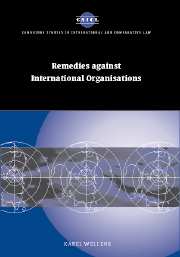Book contents
- Frontmatter
- Contents
- Acknowledgements
- List of abbreviations
- Introduction
- Part I General features of remedies against international organisations
- Part II Procedural aspects of remedial action against international organisations
- Part III Substantive outcome of remedial action against international organisations
- Part IV Alternative remedial action against international organisations and options for the future
- Conclusion
- Bibliography
- Index
- CAMBRIDGE STUDIES IN INTERNATIONAL AND COMPARATIVE LAW
Conclusion
Published online by Cambridge University Press: 13 July 2009
- Frontmatter
- Contents
- Acknowledgements
- List of abbreviations
- Introduction
- Part I General features of remedies against international organisations
- Part II Procedural aspects of remedial action against international organisations
- Part III Substantive outcome of remedial action against international organisations
- Part IV Alternative remedial action against international organisations and options for the future
- Conclusion
- Bibliography
- Index
- CAMBRIDGE STUDIES IN INTERNATIONAL AND COMPARATIVE LAW
Summary
The purpose of this study has been to explore the existence of, access to and the outcome of political and legal remedial mechanisms, both of which a comprehensive accountability regime for international organisations would require. In mapping this territory I have looked at the general features of remedies against international organisations as compared to remedies in international law in general and contrasted them with remedies against the main actors on the international scene. The various remedies had to be tailored to the different levels of accountability and to the wide range of potential claimants, both states and non-state entities. The remedial opportunities, both in terms of access and forum, and the remedial potential were found to vary according to the differential standing of the claimant.
The differential remedial regime that was found to exist for those who are allegedly affected in their interests or rights by acts, actions or omissions of an international organisation was also reflected in the procedural difficulties and issues each separate category faces when actually resorting to remedial action. Additionally, the category of non-state claimants is still encountering the common procedural obstacle of jurisdictional immunity before the domestic courts, which is normally claimed by and frequently granted to international organisations. The substantive outcome of their remedial action could be described as fundamentally different within that same category of non-state claimants.
- Type
- Chapter
- Information
- Remedies against International Organisations , pp. 263 - 270Publisher: Cambridge University PressPrint publication year: 2002

